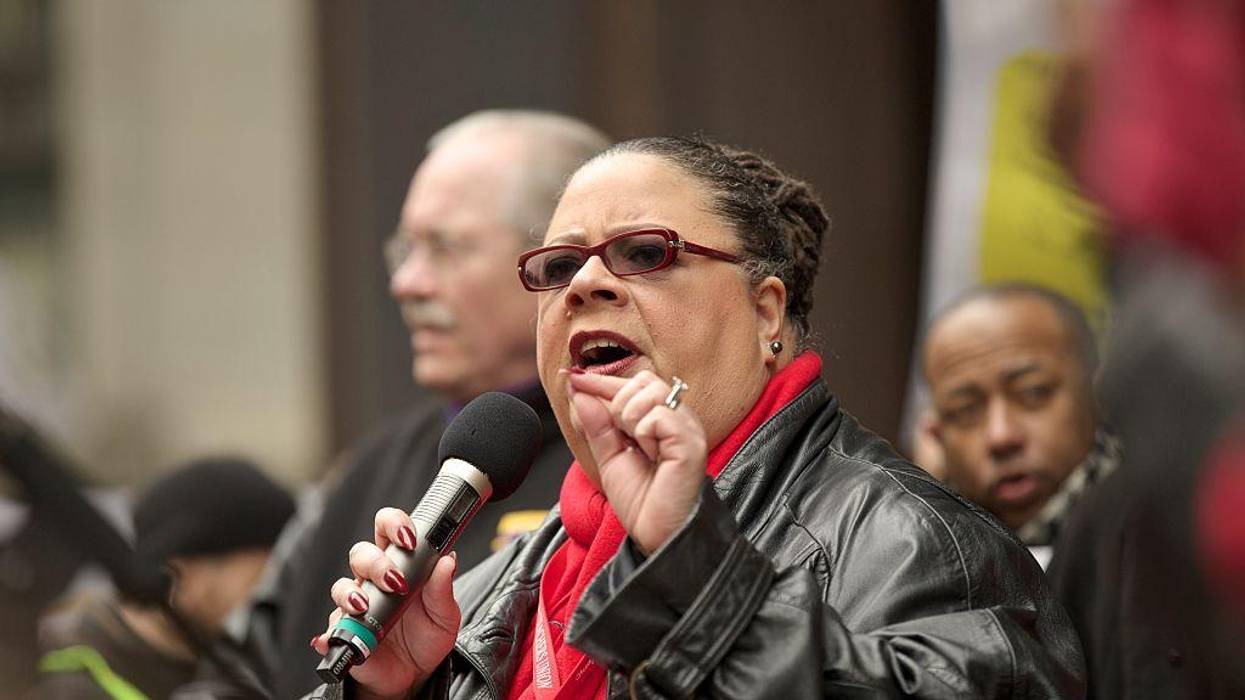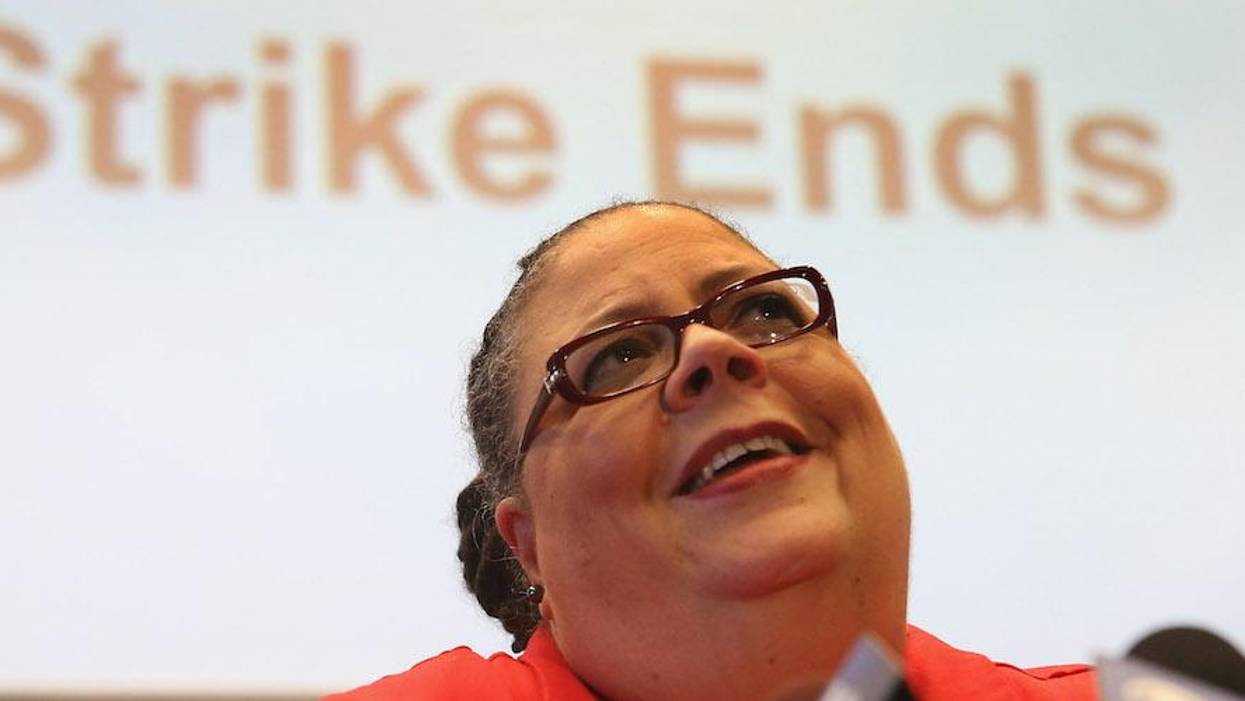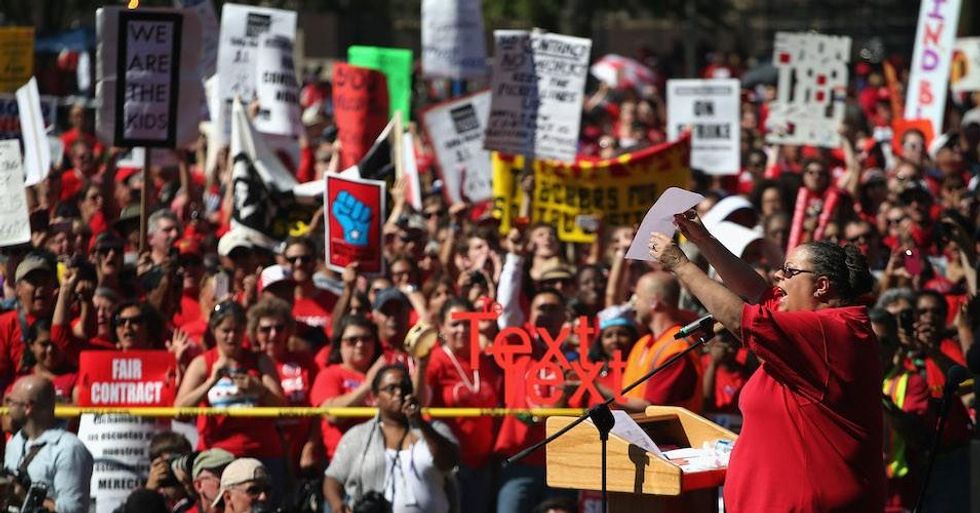Karen Lewis Lit the Spark That Inspired a Generation of Teachers and Union Organizers
When you see fire in educators who are standing with students and community to demand justice, look in those flames for her unwavering determination—and her wide smile.
Karen Lewis, the Chicago Teachers Union president who led the landmark 2012 strike, died February 7. Her generosity, charisma, and indomitable strength of purpose were gifts to labor organizers across the country who watched, learned, listened, and stepped up themselves.
She inspired a whole host of educators who had been looking for a way forward in the midst of orchestrated attacks on public schools and educators. Around the country teachers were facing weaponized high-stakes testing, defunding, charter schools, and privatization.
Lewis and the Caucus of Rank-and-File Educators (CORE) in CTU gave us a vision for the types of schools we were fighting for and a path to win those schools: rank-and-file, strike-ready, democratic unions. The 2018 red-state strike wave was lit by the sparks of Lewis's leadership in Chicago.
"When CTU went on strike in the fall of 2012," recalled Labor Notes staffer Barbara Madeloni, "I was teaching a class to future teachers at UMass Amherst. We were talking about unions and why they mattered. When I posted a photo of CTU members sitting in the street, arms locked, ready to be arrested to win their strike demands, students sat up and leaned in. The energy in the room popped.
"Suddenly, joining a union wasn't about insurance against lawsuits (yes, that is how many unions presented why you should join the union). Union fights weren't only stories from generations ago. This was an active struggle today. This was teachers fighting for students, in the job that these students were about to enter."
LEADING FROM BELOW
Lewis, a high school chemistry teacher, was elected president of CTU in 2010 on the CORE slate. She had joined CORE in its earliest form: a study group of activists against a giant wave of school closings in Chicago. (The Labor Notes book How to Jump-Start Your Union: Lessons from the Chicago Teachers tells this story in detail.)
The official union leaders had no plan to fight school closings. "I can't tell you how many times I've heard the 'there's nothing we can do' mantra," Lewis later recalled. "These teachers were talking about actually forming resistance." The group read up on disaster capitalism, social justice unionism, reform caucuses, and their own union contract.
"We went to every school closing hearing, every charter school opening, every board meeting, and we said 'No. Stop now,'" said Lewis. Each time they announced themselves as CORE, more members joined, especially from schools under attack.
Soon CORE was doing the work that union leaders should be doing--from challenging the district's bogus deficit figures to organizing a 5,000-person march that union leaders were forced to endorse. Members could see that "CORE has been doing the work of the leadership already," said Lewis. "So we felt they might as well elect us." And they did.
CORE and Lewis took leadership with a plan to reignite a fighting union--one that would take on not only its members' fights but also the struggles of the community.
The union's watershed report "The Schools Chicago's Students Deserve," released in February of 2012, outlined a new vision for public education in Chicago. Created in collaboration with students and community members, it called for robust funding, smaller classes, more nurses and social workers, and more educator voice in decisions on curriculum and other matters. The idea caught fire--countless other teacher unions have since crafted their own reports on "the schools our students deserve."
A crucial element was the union's new honesty on race. Chicago was entering an "era of educational apartheid," Lewis said, as the school closings came down hardest on Black students and Black teachers. Her personal cachet as a brilliant speaker and thinker, and as a Black leader, amplified the message powerfully.
Black educators, parents, and community activists began to trust Lewis and CTU; someone was finally telling the truth that they had been living. "The emergence of CORE allowed many of us African Americans to go, 'This is something we can get with,'" said middle school teacher Kimberly Goldbaum.
'THEY TIED OUR HANDS, WE KICKED THEIR ASSES'
Lewis and the other new officers knew they would have to build to a strike, in a union that hadn't come anywhere close in decades. Their plan to win was based on harnessing the power of the rank and file: talking to members, getting members to talk with each other and take action together for demands in their own schools.
"We decided there are other things you can do besides file a grievance," Lewis said. "We started talking to people about what you could do. We started doing very simple things--let's wear red on Friday to show our solidarity, to show we support one another. Even people you don't get along with, start talking to them. If you start communicating with one another, you build strength within your building."
One key challenge to the strike preparation was a 2010 law that required CTU to win a vote by 75 percent of the whole membership (not just of those voting) in order to authorize a strike. It was supposed to be impossible--but they hit it out of the park. The 24,000 yes votes to authorize a strike--90 percent of the membership--revealed how effectively CORE's strategies had built power and unity.
And at the height of the strike, a poll found that two-thirds of public school parents supported the union over the mayor--proving the strength of the community ties that CTU had built. The numbers were even higher among Black and Latino parents. As Lewis put it, "They tied our hands and we still kicked their asses."
HER PROUDEST MOMENT
The strike was glorious, jubilant, strong. But what Lewis would later call her "proudest moment" came at the very end, when teachers, infused with a new spirit of democracy, spent two days reading and discussing the terms of the deal, rather than ending the strike immediately.
The officers didn't go out and promote the deal. "I'm not going to say this is the greatest thing since sliced bread and try to sell it to them. I'm not a marketer," said Lewis. "Our people know how to read, they know how to do math, and they understand these things." It passed.
The following year, the union's 2013 election became a referendum on the strike and on CORE's whole strategy. Chicago media flocked to cover the opposition. But Lewis and CORE won a ringing endorsement: members reelected them with 80 percent of the vote, even more than they had gotten the first time around.
DOES IT UNITE US? DOES IT MAKE US STRONGER?
The strike electrified teacher (and other) unionists across the U.S., and CORE's influence resounded through networks like Labor Notes and the United Caucuses of Rank-and-File Educators.
When Lewis spoke at the opening plenary of the 2014 Labor Notes Conference in Chicago, she drove home the importance of building a militant, bottom-up labor movement. The speech is characteristically funny, engaging, and powerful. She takes apart the oft-repeated lie that "You should be happy to have a job": "So that anything anybody does to you, strip away your dignity, keep you on your knees, you should be happy? I'm not singing that song." Watch it here.
She was a teacher of teachers, and an organizer of organizers. She always came back to three questions: "Does it unite us? Does it build power? Does it make us stronger?"
In 2015, Lewis was considering a run for mayor of Chicago (and was regarded as a serious contender to win) when she was diagnosed with brain cancer. A years-long struggle ensued, to which she succumbed on Sunday.
The news of her death came as CTU was in the midst of protracted and brutal negotiations over the return to school buildings. Members voted to authorize another strike if the district insisted on locking out PreK-3rd grade educators (the first wave in a phased return) who were demanding to work remotely for their safety and that of the community. This collective action forced the district to accept a delay and bargain with the union over the terms of return.
Members voted yesterday to accept the agreement, which increases vaccine access for educators required to enter buildings, delays the return to buildings for some educators, establishes union-dominated building safety committees, guarantees Americans with Disabilities Act accommodations for educators who are primary caregivers to individuals especially vulnerable to Covid, and establishes metrics for what would prompt the district to close school buildings and go fully remote again. The agreement was hard-won; enforcing it will require the kind of building-site organizing Lewis championed.
The energy that Karen Lewis brought to the teacher union labor movement vibrates through unions across the country. When you see fire in educators who are standing with students and community to demand justice, look in those flames for her unwavering determination--and her wide smile.


